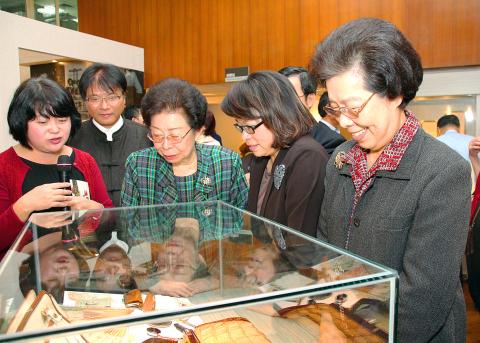A museum honoring former -Chiayi mayor Hsu Shih-hsien (許世賢) opened on Saturday, with an exhibition showcasing her memorabilia and diaries.
Hsu was a significant influence on the development of Chiayi and the nation, exhibition convener Tsai Shu-chuan (蔡淑娟) said.
The opening ceremony was attended by former Chiayi mayor Chang Wen-ying (張文英) and Central Election Commission Chairperson Chang Po-ya (張博雅) — both Hsu’s daughters — as well Chiayi Mayor Huang Min-hui (黃敏惠) and other friends and family.

Photo: CNA
“Hsu’s attitude reflected the spirit of what it meant to be a Chiayi resident, and more over, a citizen of Taiwan — to do what was right no matter the cost,” Huang said.
“Hsu’s abilities and far-reaching vision were well known by all those who knew her, but her letters and diaries also help reveal a more personal side to her,” Tsai added.
In 1941 when Hsu and her husband Chang Chin-tung (張進通) first opened the Shun Tian Tang hospital in Chiayi, Tsai said Hsu Shih-hsien had written in her diary: “My greatest wish for starting the Shun Tian Tan Hospital is the hope of seeing the sick able to leave with [a heart filled with] gratitude.”
Hsu was not well-off at that time, in fact she had to write to her mother and ask her for help in raising the funds to start the hospital, Tsai said, adding that Hsu had never taken even a single cent from the poor who came to the hospital to be treated.
“She was very concerned about both the common people and the affairs of state, and even wrote to her husband when she was in Japan wishing to immediately return because she had heard of the difficulties with which Taiwan’s government was faced,” Tsai said, adding that Hsu had also written to her children telling them of scenes of suffering during World War II.
Her concern for the people was not confined to private messages between family members either, Tsai said, adding that after being elected as a provisional, and later full-time member, of the Taiwan Provincial Council in 1954, she had been almost the first to raise proposals for the draft jury act, the concept of governmental insurance subsidy for the unemployed, and the need for a consecutive state education plan.
“Hsu had also been a great proponent of women’s rights in Taiwan, having famously told her husband: ‘Females can also do great things’ when both of her male children died in early childhood,” Tsai said.

An essay competition jointly organized by a local writing society and a publisher affiliated with the Chinese Communist Party (CCP) might have contravened the Act Governing Relations Between the People of the Taiwan Area and the Mainland Area (臺灣地區與大陸地區人民關係條例), the Mainland Affairs Council (MAC) said on Thursday. “In this case, the partner organization is clearly an agency under the CCP’s Fujian Provincial Committee,” MAC Deputy Minister and spokesperson Liang Wen-chieh (梁文傑) said at a news briefing in Taipei. “It also involves bringing Taiwanese students to China with all-expenses-paid arrangements to attend award ceremonies and camps,” Liang said. Those two “characteristics” are typically sufficient

A magnitude 5.9 earthquake that struck about 33km off the coast of Hualien City was the "main shock" in a series of quakes in the area, with aftershocks expected over the next three days, the Central Weather Administration (CWA) said yesterday. Prior to the magnitude 5.9 quake shaking most of Taiwan at 6:53pm yesterday, six other earthquakes stronger than a magnitude of 4, starting with a magnitude 5.5 quake at 6:09pm, occurred in the area. CWA Seismological Center Director Wu Chien-fu (吳健富) confirmed that the quakes were all part of the same series and that the magnitude 5.5 temblor was

The brilliant blue waters, thick foliage and bucolic atmosphere on this seemingly idyllic archipelago deep in the Pacific Ocean belie the key role it now plays in a titanic geopolitical struggle. Palau is again on the front line as China, and the US and its allies prepare their forces in an intensifying contest for control over the Asia-Pacific region. The democratic nation of just 17,000 people hosts US-controlled airstrips and soon-to-be-completed radar installations that the US military describes as “critical” to monitoring vast swathes of water and airspace. It is also a key piece of the second island chain, a string of

The Central Weather Administration has issued a heat alert for southeastern Taiwan, warning of temperatures as high as 36°C today, while alerting some coastal areas of strong winds later in the day. Kaohsiung’s Neimen District (內門) and Pingtung County’s Neipu Township (內埔) are under an orange heat alert, which warns of temperatures as high as 36°C for three consecutive days, the CWA said, citing southwest winds. The heat would also extend to Tainan’s Nansi (楠西) and Yujing (玉井) districts, as well as Pingtung’s Gaoshu (高樹), Yanpu (鹽埔) and Majia (瑪家) townships, it said, forecasting highs of up to 36°C in those areas